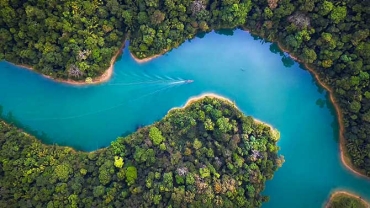
Hans de Kroon (Radboud University) on the importance of biodiversity and COP15
The UN summit on biodiversity (COP15) starts right on time. The earth's natural capital is in decline and thus our first line of life is under pressure. This has implications for all of us, including the future resilience of organizations.
We asked our network of experts about the expectations and opportunities of this summit, because only together can we make progress. Today: Hans de Kroon, professor of plant ecology at Radboud University.
Hans de Kroon is trained as a plant ecologist, focusing on the interactions between plants, especially underground at roots and the behavior of plants in the soil. Interacting plants are already fascinating, but he became increasingly interested in regulating the biodiversity of ecosystems. His mission is learning to understand how species diversity is maintained in plant, bird and insect communities. How does he view COP15 and what does it mean for ambitions within the business community?

Hans de Kroon: 'COP15 makes biodiversity urgent and puts it on the agenda.'
The great loss of biodiversity and COP15 is on the front pages of newspapers these days. NRC talks about "mass extinction" and Trouw states that by 2030 at least 30 percent of natural areas must be protected. What are your expectations from this UN summit regarding nature?
'It is of enormous importance that all parties - governments, NGOs, the industrial sector - put their heads together with biodiversity as their main topic. The conference, like the influential 2019 IPBES report on biodiversity and ecosystems, makes the topic even more urgent and will therefore be agenda-setting.'
Urgent and agenda-setting, those are hopeful words.
'Yes, but at the same time I do not have overblown expectations, also based on the last climate conference. I would be pleasantly surprised if binding agreements are reached here that are a game-changer for biodiversity restoration.'
'Every company can go climate neutral'
The Global Biodiversity Framework has formulated a first draft of four long-term goals for 2050 and more than 20 sub-targets for 2030. These targets will be negotiated at COP15. One of the targets is to use "nature-based-solutions" to mitigate climate change by at least 10 gigatons of CO2 equivalent. What are your thoughts on this objective?
'It is certainly possible to restore nature while storing a lot of carbon. Think of restoring peat systems by raising water levels or restoring natural forests. This goal involves the ideal combination of providing opportunities for biodiversity and restoring an ecosystem that naturally sequesters carbon. So this is definitely a very important objective.'
If this goal is formally established, what does it mean for business? What should companies and factories do if non-commitment gives way to a real commitment?
'Each company can set a goal that they will work climate-neutral within the entire production chain over a period of several years. That means zero carbon dioxide emissions. Really ambitious, really different and really fast.'
'I already see this ambition in practice. For example with the water boards and infrastructure works. That is good for climate and good for biodiversity. In addition, every company can work in a biodiversity-neutral way or, better still, promote biodiversity. This means, for example, that the extraction of raw materials is not at the expense of natural systems and that biodiversity is promoted through mitigation measures.'
The Convention on Biological Diversity, as mentioned earlier, has formulated several objectives. From your knowledge and expertise, which objective do you think is important to highlight?
'To me, that is objective number fourteen: 'Mainstreaming Biodiversity.' Things will only really change if we embrace biodiversity as something that belongs to us, as something that we are a part of and as something that we always want to take into account and in all our activities. We need to see biodiversity as an evident and natural process. Seeing biodiversity as something that primarily provides essential services for us is insufficient for a truly sustainable future of nature.'




















